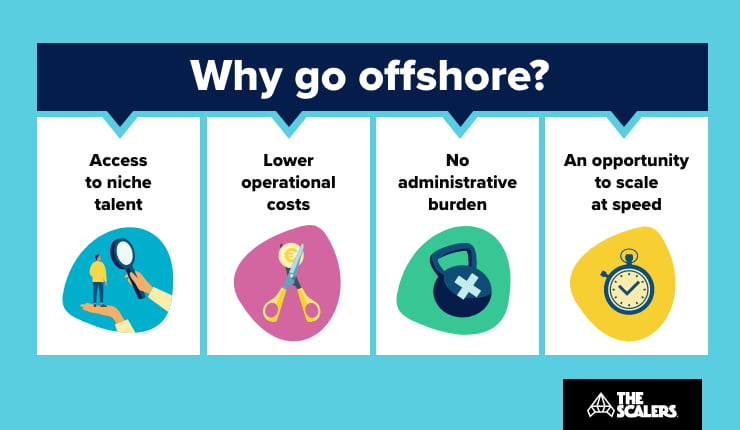The benefits of offshore teams for building software

Today, software companies invest a massive amount of time, effort, and capital into creating powerful, innovative, and relevant software solutions and stay at the very top of their game. However, with the industry becoming more and more saturated, standing out from the crowd is becoming increasingly difficult.
And that’s because, as an enterprise, custom software development is far from easy. The competition for recruiting top tech talent with specialised skills is fierce. The result? Average developers, mediocre software, lower-quality output, less reliable development, and smaller profit margins.
However, lucky for you, it’s 2021 and the race for local talent is no longer the only option. Today, in the almost-aftermath of the pandemic, global businesses are turning towards offshoring — a model that allows them to build dedicated teams of elite software developers in another country.
This blog is a useful, proactive comparison of both local development and offshore teams. Specifically, we’ll analyse how each stacks up against three crucial factors: cost, talent, and getting the job done. If you’re an SMB or an enterprise looking to scale your existing tech team, then you’ll find this comparison extremely useful.

First things first: how much does it cost?
Software engineers are one of the most highly-paid workforces in the world today. It’s no shock, then, that the decision to go offshore is largely driven by cost.
Staying local
In Western countries hiring local talent means significant outlays. If you want the best talent, you need to pay an absolute premium. And salary is only one aspect: there’s the whole recruitment process (and their generous fees), the office space and equipment, plus employee-centric extras like health insurance, flexible working, and plenty others.
Building an offshore team
Things are a bit different if you take the offshore route. For starters, the cost of living in countries like India and Ukraine is significantly lower than in the West. This correlates with salary, and so it’s much cheaper to hire equivalent labour through offshoring than in your local area.

Note we’re talking about equivalent engineers who happen to live in India, not half-trained programmers with no real experience. Cities like Bangalore offer thriving and talented IT communities. Software development education there is highly desired, sitting comfortably in the same bracket as lawyers, doctors, and dentists. So when you engage with the right offshore partner, you can always find developers who meet or exceed, your requirements — all at a much lower cost.
And all those related expenses, like healthcare, recruitment, and office spaces? Drops in the ocean compared to European or American prices.

Your crash course on everything offshoring. What is it? How does it work? Is it for you?
DOWNLOAD EBOOKAccessing talented and forward-thinking engineers
When you’re hiring new recruits into the business, it’s usually because you’re scaling up. Not much, maybe, but enough to require some extra internal capacity.
And if you’re an established enterprise looking to take on well-trained, hardworking developers at any level, then you’re in for a rough road! As it turns out, the recruitment process itself is one strong reason companies are beginning to look for teams offshore. Here’s why.
Staying local
We’ve already looked at how expensive salaries can be for Western companies. Unfortunately, that’s not the only cost of building out your team. Recruiter fees average between 20 to 35% of your new employee’s annual salary, if not more!

The real problem (and part of why recruiters are charging so much) is the scarcity of local talent. Even in major cities like Paris, there tends to be a deficit of quality software engineers available at an affordable cost. Paying full-time employees $60-100 per hour is far above the resources of most companies, but that’s what it’s starting to take.
The power is totally in the hands of the engineers themselves. They’re a scarce commodity and they can pick and choose their employers. If you’re not offering the most exciting work or the most lucrative contract, then why should they pick your company?
Building an offshore team
One sure-shot way to ensure that you escape the scarcity and sky-high pricing is by going offshore.
The abundance of extremely well-trained developers in India is astonishing. India produces over 1.5 million new engineers every single year, and they flock to tech hubs like Bangalore.
And they speak English with total fluency, too. Language barriers with Indian developers inevitably stem from companies who, as opposed to investing in a world-class development centre, are paying freelancers pennies for low-quality work. It’s just one of several myths about offshoring that, in reality, doesn’t carry any weight.
Both software engineering and English language teaching are prized by the Indian education system. The result isn’t a blitz of introverted tech wizards lacking people skills; it’s well-balanced, proactive engineers who can take command of their projects and assimilate perfectly into teams of westerners. That leads us on to our final point…

Can’t find the skills you need at home? Stop searching and start scaling
LEARN MORECan I outsource instead?
Of course. This is an option that’s good for one-off projects. Outsourced engineers aren’t hired by you, but by an external third-party vendor and typically juggle work for many businesses and projects at the same time. Because they’re external support, the developers don’t have cultural buy in to your organisation, ethos, or your long-term vision.
On the flip side, with an offshore team – the developers are hired by you at the final stage, after an offshore partner like The Scalers has implemented a thorough recruitment process combining both technical and personality assessments. This is to ensure the developers hired are a perfect fit for your organisation over the long term.
Outsourcing is often seen as an unsustainable, short-term solution for businesses with long-term scaling in mind. It’s viewed by many CTOs as a quick fix that allows a company to complete small projects such as building an app quickly to meet the stipulated deadline. For enterprises seeking to grow sustainably, a dedicated team that acts as a value-adding extension of their team at home is the preferred route to go down.
Can enterprises grow with an offshore team?
An enterprise can indeed grow with an offshore team, scaling up from startup to small enterprise and small enterprise upwards without limits. On a day-to-day basis, as an enterprise, can you actually scale your business and thrive doing it, given that half of your developers working thousands of miles away in a different time zone?
Absolutely.
It’s a valid concern that unsupervised, any group of new employees might not put 100% into the job. But this assumption forgets a crucial tenet of offshoring: they are a fully integrated extension of your local team. Including management that reports directly to you. And with the right offshore partner by your side, there’s no reason to worry. Your offshore partner will take care of recruitment, operations, administrative duties, and more while you continue to scale your team and business.
As far as culture goes, it’s your work culture, your ethos, and your rules which all these new employees play by. Offshoring isn’t like outsourcing, where you pay freelancers to complete minor tasks. We’re talking about full-time, well-compensated professionals who are passionate about their work. If it works at home, it will work offshore. And, if it works for smaller businesses, you can grow with an offshore team as an enterprise also.

How to make offshore teams function well day-to-day
We’ve covered this in detail with a specific blog post — 8 modern strategies to make remote teams work in 2021, but we’ll run over the essentials here. First job? Implement good communication and task-scheduling tools, if you’re not already using them.
If you’re all sharing one office, you can almost get away with ignoring modern work tools like Slack, Asana, or Skype. We don’t recommend it, but it does happen with smaller teams. When you build your offshore team, there’s no room for that gung-ho attitude. You need structure, and you need it yesterday.

How we helped a fintech establish a dedicated development centre in Bangalore
DOWNLOAD CASE STUDYFrom instant messaging and video calls to task scheduling, there’s a lot of simple processes you can put in place which massively streamline everything you do. Share the right tools and explain how your team uses them, and everything will come together nicely and smoothly. It’s also good to emphasise a culture of ‘if you’re not sure, ask’ — it helps overcome a lot of hurdles early on.
And that’s it really. If business is steady and your team’s all happy, and you don’t have any plans to scale up anytime soon, then you absolutely don’t need to invest in an offshore team. However, if growth is on your mind (or if you simply can’t fill the empty capacity in your office) then extending your team to India might be a rewarding and lucrative option.
If you’re thinking about it, one of our senior executives would be happy to answer any of your questions. Fill the contact form to schedule a free call. We can’t wait to hear from you.














